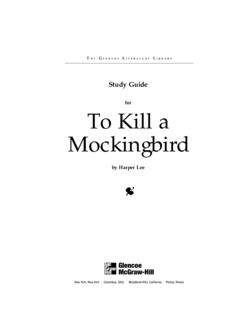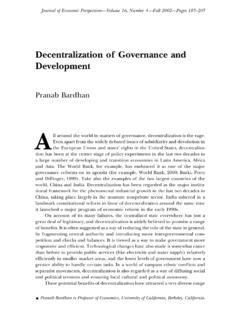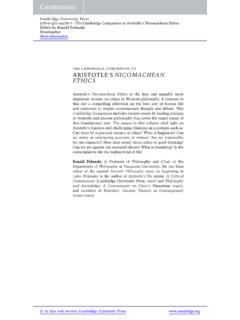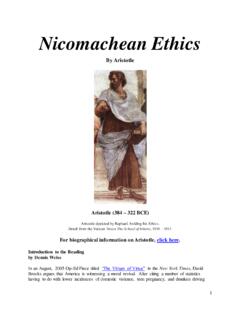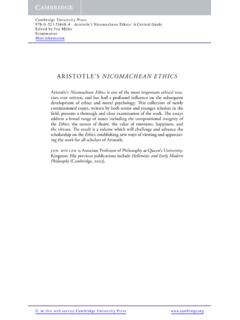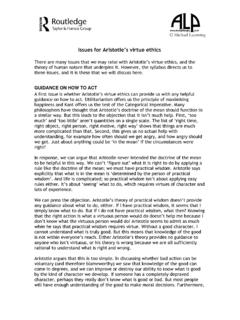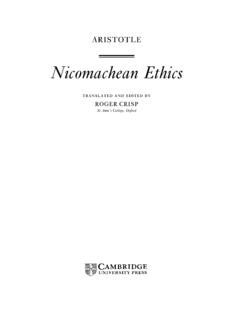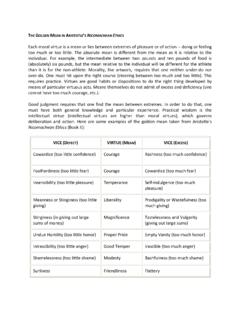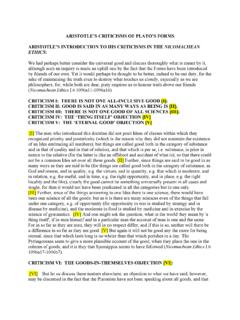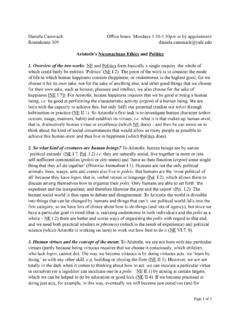Transcription of What is Theoria Nicomachean Ethics Book 10.7–8
1 what is Theoria ? Nicomachean Ethics book 8 Author(s): David RoochnikSource: Classical Philology, Vol. 104, No. 1 (January 2009), pp. 69-82 Published by: The University of Chicago PressStable URL: .Accessed: 20/08/2014 13:21 Your use of the JSTOR archive indicates your acceptance of the Terms & Conditions of Use, available at ..JSTOR is a not-for-profit service that helps scholars, researchers, and students discover, use, and build upon a wide range ofcontent in a trusted digital archive. We use information technology and tools to increase productivity and facilitate new formsof scholarship. For more information about JSTOR, please contact .The University of Chicago Press is collaborating with JSTOR to digitize, preserve and extend access toClassical This content downloaded from on Wed, 20 Aug 2014 13:21:39 PMAll use subject to JSTOR Terms and ConditionsNOTES AND DISCUSSIONS69 2009 by The University of Chicago.
2 All rights permission to reuse, please contact IS Theoria ? Nicomachean Ethics book 8 aristotle s Nicomachean Ethics book 8 has sparked an apparently intractabledebate among scholars: is this passage, with its extraordinary praise of the theo-retical life, compatible with the rest of the work? In 20 aristotle saysthat complete happiness (tele a eu daimon a) is the actualization of the supreme (krat sth) virtue, which in turn is the work of what is best in us, namely mind (nou ).1 He describes such work as theoretical (qewrhtikhv), and argues that it isthe most continuous, pleasant, self-sufficient, and leisurely activity available to humanbeings.
3 (My reasons for avoiding the more familiar contemplation and its variantsas a translation of Theoria will emerge below.)2 Furthermore, it alone seems to beliked because of itself (1177b1), for it supplies no benefit other than Finally,theoretical activity actualizes what is most divine in us and allows us best to ap-proximate the gods, whose activity is superior in blessedness and is itself theo-retical. As a result, aristotle demotes practical virtue, a life spent in ethical andpolitical that is, distinctly human activity, to a secondary demotion, as well as some of the features attributed to the theoretical life,seem to conflict with earlier descriptions of ethical virtue.
4 As Martha Nussbaum puts it, book 8 seems to be at odds with the general anthropocentrism of aristotle sethical method.. In the other books of the EN, activities according to the excel-lences of character are explicitly said to be valuable or choiceworthy for their ownsake. 4 J. L. Ackrill says something similar: most of the Ethics implies that a goodaction is or is a major element in man s best life, but eventually in book 10 purelycontemplative activity is said to be perfect eudaimonia; and aristotle does not tellus how to combine or relate these two ideas. 5 The problem is exacerbated by thefact that 8 seems to invoke an exalted form of contemplation (a notion to beexplained below), which Nussbaum characterizes as more Platonic than As a result, she judges book 8 to be incompatible with earlierstages of the Nicomachean The Greek text of the Nicomachean Ethics is Bywater s Oxford edition (1962).
5 All translations aremy Derived from contemplor, to gaze at, to view attentively, the English contemplation has theobvious virtues of tradition and etymological correspondence with the Greek qewr a, derived from qewrevw, to look at or to view. My complaint against it is directed at its connotations as it is used in Because monhv at 1177b1 renders the meaning of the sentence somewhat ambiguous, Irwin (1999) offerstwo translations: study seems to be liked because of itself alone and it is the only virtue liked becauseof itself. His translation of Theoria as study is, as will be shown later in this paper, an excellent Nussbaum 1986, Ackrill 1980, Nussbaum 1986, content downloaded from on Wed, 20 Aug 2014 13:21:39 PMAll use subject to JSTOR Terms and ConditionsNotes and Discussions70To formulate this point in standard terminology, book 8 seems to express an exclusivist or dominant account of happiness that is at odds with the prevailingaccount found in the rest of the work.
6 As Roger Crisp explains, the dominant thesis[is] the view that there are several intrinsic goods, only one of which constituteseudaimonia. 7 The one of course is theoretical are different versions of the dominant reading. John Cooper, for example,argues that the happy person leading the best life need not be ethically virtuous: inhis final account of happiness in book X of the Nicomachean Ethics aristotle soelevates the value of intellectual activity of the highest kind that he leaves no roomat all .. for morality as ordinarily understood and as analyzed by himself in earlierbooks. 8 Andrea Nightingale makes a similar claim: the theoretical wisdom praisedin book 8 is essentially amoral.
7 9 Richard Kraut, by contrast, while embracingthe exclusivist interpretation, nonetheless insists that the philosophical life is thelife of a good person, that is, someone who has and exercises the ethical virtues. 10 Explaining how the apparent contradictions of the Ethics are merely apparent, 11while maintaining an exclusivist view of happiness, becomes the major task Kraut andlike-minded commentators (such as Gabriel Richardson Lear) set for paper cannot resolve this intricate debate. It cannot explain how book 8is, or is not, compatible with earlier books of the Nicomachean Ethics , or how theo-retical virtue is related to practical virtue, or exactly what complete happiness really means.
8 (See Kraut, Nightingale, and Richardson Lear for extensive bibliog-raphies.) Instead, it addresses only an odd feature of it. Commentators who enter itgenerally say little about what theoretical activity itself actually is. On the onehand, this is unsurprising, for aristotle himself says so little about it. Trond Eriksenputs the point strongly: aristotle , he says, has no clear-cut conception of Theoria . 13On the other hand, some conception of theoretical activity is surely required in orderto grapple seriously with the notorious problem sparked by his comments in 8. The purpose of this paper is to take a small step toward filling this Exalted Conception of TheoriaAristotle never explicitly articulates what Theoria is, but he does provide important, it is regularly characterized as the actualization of Crisp 1994, Cooper 1999, 216.
9 Cooper changed his mind on this issue. This quotation is actually from his laterwork when he is describing his earlier view; see also Cooper 1975, chap. Nightingale 2004, Kraut 1989, Ibid., In her recent work Richardson Lear (2004) has argued that aristotle thinks that happiness is foundin theoretical activity alone, but because it is the telos of human life, other subordinate, or middle-levelends, morally virtuous action in particular, are still worth choosing for their own sake. As she puts it, suchends approximate or imitate the highest end and when one thing approximates another it inherits the kindof value possessed by the paradigm .. so if morally virtuous activity is choiceworthy for the sake of con-templation as an approximation or imitation of that activity, it will not be merely instrumentally.
10 It will itself be worth choosing for its own sake (85). Another possible take on the issue isto argue that all other virtues are instrumentally related to the attainment of the highest, theoretical Kraut 1989, 178 79 for this line of Eriksen 1976, Eriksen (1976, 82 84) reviews discussions of this issue by John Burnet, Ingemar D ring, and JuliusStenzel. He also cites the following passages to support it: Eth. Nic. 1146b30, 1153a22, Metaph. 1048a34,1072b24, Ph. 255a33-b5, De an. 412a9 22, Protrepticus B87, Gen. an. content downloaded from on Wed, 20 Aug 2014 13:21:39 PMAll use subject to JSTOR Terms and ConditionsNotes and Discussions71 Consider De anima book Here aristotle is gradually working his way towarda definition of soul.



